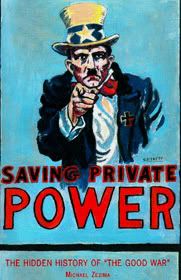
I must be coming across as a Ken Burns' groupie with all these posts on the war.
I am well aware of the criticisms and they have been mentioned previously. I came across the Unrepentent Marxist and here is some of what he had to say
"Just around the time I watched Clint Eastwood’s “Letters from Iwo Jima,” I decided to take in as much of Ken Burns’s PBS series on WWII titled “The War” as I could bear. As should be obvious from my review of Stephen Spielberg’s “Saving Private Ryan,” I am no fan of WWII nostalgia.
..... All in all, I find that his documentaries tend to wrap their subjects in a kind of hagiographic gauze. Whether he is dealing with Duke Ellington or some marine who killed a bunch of Japs (as the interviewees are wont to say), you feel as if you are being introduced to a demigod. ....
I managed to watch most of three episodes of “The War”. It is a mixed bag, with the kind of hero worship found in “Band of Brothers” but focused on ordinary soldiers rather than the top generals. It also describes WWII as a cataclysm rather than a glorious adventure. Finally, it zeros in on the racism directed at Black and Japanese-American soldiers......
Episode one is titled “A Necessary War” and is probably the most repugnant in the entire series. It is focused on the aftermath of Pearl Harbor and is filled with all sorts of really ugly characterizations about the Japanese. In keeping with the almost total refusal to engage with the historical causes of WWII, the program guide states:
For most Americans finally beginning to recover from the Great Depression, the events overseas seem impossibly far away. But on December 7, 1941, their tranquil lives are shattered by the shock of the Japanese attack on Pearl Harbor, and America is thrust into the greatest cataclysm in history.
Well, the attack on Pearl Harbor might have been a shock to the average American but not to the corporate elite and military brass who understood that the Japanese had almost no alternative except to go to war after the US decided to put a stranglehold on oil. Then, as now, oil had a way of making nations go to war.
If Burns was following convention in describing Pearl Harbor as a bolt from the blue, there are alternative interpretations. Chapter four of Michael Zezima’s “Saving Private Power: the hidden history of ‘The Good War’” targets the myth that “The attack on Pearl Harbor was a surprise”:
The build-up to Pearl Harbor began two decades prior to the attack when, in 1922, the U.S., Britain, and Japan agreed that the Japanese navy would not be allowed more than 60 percent of the capital ship tonnage of the other two powers. As resentment grew within Japan over this decidedly inequitable agreement, that same year the United States Supreme Court declared Japanese immigrants ineligible for American citizenship. This decision was followed a year later by the Supreme Court upholding a California and Washington ruling denying Japanese the right to own property. A third judicial strike was dealt in 1924 with the Exclusion Act which virtually banned all Asian immigration. Finally, in 1930, when the London Naval Treaty denied Japan naval hegemony in its own waters, the groundwork for war (and “surprise attacks”) had been laid. Upon realizing that Japan textiles were outproducing Lancashire mills, the British Empire (including India, Australia, Burma, etc.) raised the tariff on Japanese exports by 25 percent. Within a few years, the Dutch followed suit in Indonesia and the West Indies, with the U.S. (in Cuba and the Philippines) not far behind. This led to the Japanese (correctly) claiming encirclement by the “ABCD” (American, British, Chinese, and Dutch) powers. Such moves, combined with Japan’s expanding colonial designs, says Kenneth C. Davis, made “a clash between Japan and the United States and the other Western nations over control of the economy and resources of the Far East and Pacific…bound to happen.” Burns not only leaves out these dimensions, he treats the Philippines practically as American territory–which, come to think of it, it was. But Ken Burns is not interested in trying to figure out what caused the war. His goal is to mine the stories of hitherto obscure fighting men and their wives and lovers for personal drama. The war becomes a kind of rite of passage in which young men become adults. You are initiated by killing Nazis or “Japs” rather than enduring tribal scars or some other test of your manhood. This seems like an awful waste considering the cost in life and treasure. When Burns was interviewed by Fox News, he tried to draw comparisons between WWII and the current war in Iraq. He said that he was not interested in making a political statement about the first war, but did note that there was a sense of national unity then that cannot be found today. As he put it, we were all in the same boat and all the oars were moving in the same direction in WWII. Whatever Ken Burns’s attitude toward the war in Iraq, there is no doubt that “The War” will reinforce all the worst prejudices in American society. If the US had a right to control resources in Asia in the name of democracy against “evil dictators”, why should it not have the same right today?"






No comments:
Post a Comment